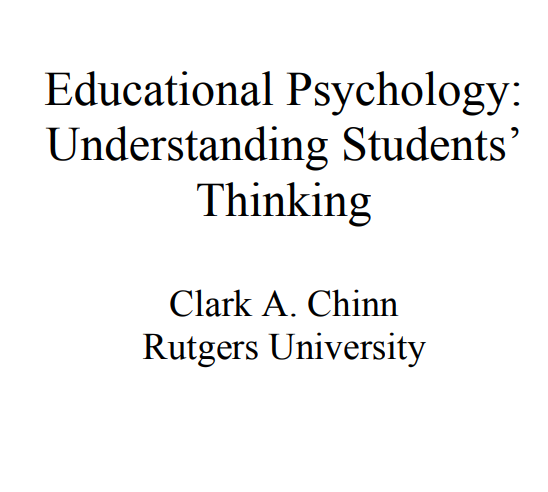Educational Psychology Understanding Students Thinking this textbook is about how students learn and how teachers can teach well. Although this textbook assumes no prior knowledge about educational research, it is intended to be much more than just an “introduction” that will lay the groundwork for you to learn to teach later on. On the contrary, as you read this book, you will learn theory- and research-based skills that you could apply right away as a teacher.

My expectation is that you will gain a deep understanding of educational theory and practice grounded in many, many examples of classroom learning and instruction. You will have the opportunity to learn teaching skills that will make you a very successful teacher (if you have not taught before) or will help you to become a more successful teacher (if you are already teaching)
Educational Psychology Understanding Students Thinking
WHY STUDY EDUCATIONAL RESEARCH?
Why to study educational research? My answer is simple: Educational researchers have developed very powerful ideas about learning and teaching over the past several decades. By applying these ideas, teachers can teach much more effectively than they could have they not learned these ideas.
Let me start with a personal example. After earning a master’s degree in Teaching English as a Foreign Language, I began my teaching career teaching English in Japan. I taught for over four years in Japan before I entered a doctoral program to become an educational researcher. My master’s degree had not focused much on the research on learning and teaching, so my doctoral program was my first exposure to such research.
About three years into my doctoral program, it struck me that my ideas about how to teach were now completely different from when I was teaching in Japan, as a result of what I had learned about learning and teaching in my courses. I realized that if I were to go back and teach English in Japan again, I would do virtually everything differently.
What had I learned that was so transformative? I had learned completely new ways of motivating students–ways I had never considered before Error! Bookmark not defined… I had learned about the importance of metacognition, which refers to students’ awareness of how they are learning and how they can learn more effectively by using better study strategies (Azevedo & Hadwin, 2005; A. L. Brown, Bransford, Ferrara, & Campione, 1983). (We will discuss metacognition in more detail later in this chapter.)
I had completely new ideas about which study strategies are most effective. I had also learned completely new approaches of organizing group works effectively (A. King, 1991, 2002; O’Donnell, 1999, 2006; Webb, 1982; Webb, Farivar, & Mastergeorge, 2002). And perhaps most importantly, I had learned about the importance of paying very detailed attention to my students’ ideas.
Read Also: Biography of Nip Baruah
I had learned that students do not come to learning tasks with “empty heads” waiting to be filled with information provided by the teacher. Instead, students come to class with their own ideas about what they are learning, and these ideas profoundly affect what they learn (R. Driver & Easley, 1978; Shtulman, in press).
Therefore, to understand how students are learning and how I should teach to help them learn more effectively, I really had to understand my students’ thinking. Indeed, this idea is so important that it has become the subtitle of this textbook: Understanding students’ thinking.
Reflecting on all that I had learned in my doctoral program, I wish that I had learned all these powerful ideas before I had begun teaching! Although I worked hard and conscientiously as a teacher in Japan, I now realize that I could have been far more successful if I had only known what I had learned in my doctoral program. My goal in writing this book is to try to help you, as a future or present teacher, learn about these powerful ideas now.
Disclaimer:- Dev Library is not the owner of the books and neither it creates books. We just provide the links of the book for the rural and poor students who don’t afford to buy books. Those E-Books and Pdfs are already available on the internet. For any reason, if someone thinks that I’m violating any laws or if anyone has any issues regarding this, please feel free to Contact Us.

Hi, I’m Dev Kirtonia, Founder & CEO of Dev Library. A website that provides all SCERT, NCERT 3 to 12, and BA, B.com, B.Sc, and Computer Science with Post Graduate Notes & Suggestions, Novel, eBooks, Biography, Quotes, Study Materials, and more.

